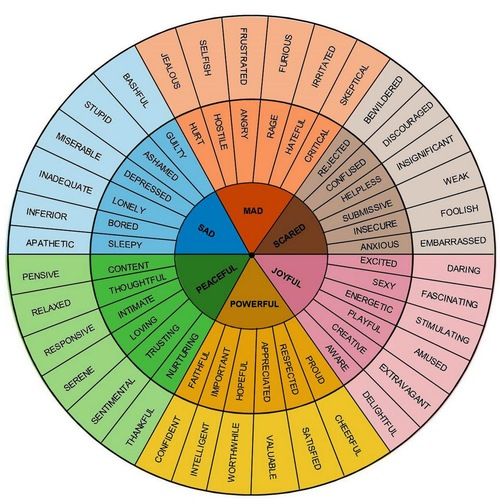Can You Describe What You Are Feeling Right Now? (Part 1 of Emotional Health: What Is It?)
There is no MRI machine that can diagnose emotional health. However, if you are claustrophobic, getting in one of these may help you feel some strong emotion.
We can go to a doctor and get a few tests done, and within a few days we will know whether we are physically healthy. Due to a blood test, readings on height and weight, a blood pressure reading, and a few other tests we can know where we stand. For a specific injury, we may need an x-ray or an MRI to pinpoint the problem. The medical community knows what numbers are too high and what numbers are too low. For me, my LDL cholesterol (the bad kind) is too high and my HDL cholesterol (the good kind) is too low.
We can go to a doctor and get a few tests done, and within a few days we will know whether we are physically healthy. Due to a blood test, readings on height and weight, a blood pressure reading, and a few other tests we can know where we stand. For a specific injury, we may need an x-ray or an MRI to pinpoint the problem. The medical community knows what numbers are too high and what numbers are too low. For me, my LDL cholesterol (the bad kind) is too high and my HDL cholesterol (the good kind) is too low.

Emotional health is not so easily defined or tested. Here, I want to explain what emotional health is to the best of my ability. There are no easy tests to run or numbers to evaluate. However, I will throw out some thoughts I have gleaned over the years from the Bible, counseling experience, and life experience. I do not claim to be the authority, but I hope these principles help you reflect on your health.
1. An emotionally healthy person has an expansive emotional vocabulary. There are more emotions that we experience than happy and sad. If asked how you feel, do you have a tough time coming up with a word that fits? Do you always use the same few words to describe your emotions? Do you use words that are not emotions to describe your emotions? For example, if someone asks how you feel and you say, "I feel like nothing ever goes my way," you are not using an emotional word, but a description. Seek to expand your emotional vocabulary if you find yourself saying "yes" to some of the questions above. This can be helpful as you seek to understand what you experience emotionally and as you seek to allow others to know you and know how you are doing.
- An emotionally healthy person has an expansive emotional vocabulary.
- An emotionally healthy person is willing and able to feel a variety of emotions and does not refuse to feel any specific emotion.
- An emotionally healthy person is in touch with their emotions, but is not dominated by them.
1. An emotionally healthy person has an expansive emotional vocabulary. There are more emotions that we experience than happy and sad. If asked how you feel, do you have a tough time coming up with a word that fits? Do you always use the same few words to describe your emotions? Do you use words that are not emotions to describe your emotions? For example, if someone asks how you feel and you say, "I feel like nothing ever goes my way," you are not using an emotional word, but a description. Seek to expand your emotional vocabulary if you find yourself saying "yes" to some of the questions above. This can be helpful as you seek to understand what you experience emotionally and as you seek to allow others to know you and know how you are doing.

The chart above can be very helpful in expanding your emotional vocabulary. Although scholars and counseling professionals vary on what emotions they believe are core or fundamental emotions, they are typically very close. In the chart above, sad, mad, scared, joyful, powerful, and peaceful are the core emotions. You can trace all others to those six emotions.
Many psychologists, counselors, and emotion researchers have seen that being able to name and verbalize emotion is a huge step in regulating emotion. If emotions, or a specific emotion, are so mysterious that you can not name them or talk about them, you will not be able to regulate them. However, if you can name and communicate to others your emotions in a meaningful way, you will likely have more success in reducing negative emotion and stress.
Many psychologists, counselors, and emotion researchers have seen that being able to name and verbalize emotion is a huge step in regulating emotion. If emotions, or a specific emotion, are so mysterious that you can not name them or talk about them, you will not be able to regulate them. However, if you can name and communicate to others your emotions in a meaningful way, you will likely have more success in reducing negative emotion and stress.

In The Bible
Nowhere in the Bible have I read a command to be able to name my emotions or have an expansive emotional vocabulary. However, there are positive examples of being aware and able to name one's emotions throughout the Bible. These include psalmists spilling their emotions, apostles encouraging others based on their emotions, commands concerning our emotional lives, and even the emotions of God. Below, I have chosen five of hundreds or thousands of potential verses from the scriptures.
When I am afraid, I put my trust in you. - Psalm 56:3
The psalmist must have been able to discern and label the emotion of fear within himself to be able to turn from that fear and put his trust in God.
For what thanksgiving can we return to God for you, for all the joy that we feel for your sake before our God, as we pray most earnestly night and day that we may see you face to face and supply what is lacking in your faith? - 1 Thessalonians 3:9-10
Here, the Apostle Paul, who is known for his theology and thinking, is able to express the intimate emotion of joy to his audience.
Great peace have those who love your law; nothing can make them stumble. - Psalm 119:165
The psalmist here is able to identify the feeling of peace for himself and others as they love the law of God.
Know this, my beloved brothers: let every person be quick to hear, slow to speak, slow to anger; for the anger of man does not produce the righteousness of God. - James 1:19-20
The scriptures also include many commands regarding our emotions. To even know how we are doing with the command of being slow to anger, we must be able to discern anger and label it.
I will rejoice in doing them good, and I will plant them in this land in faithfulness, with all my heart and all my soul. - Jeremiah 32:41
Here, God is speaking about his own emotions. He will rejoice with all His heart and soul.
There is much more that could be written about reasons some of us have small emotional vocabularies and/or little ability to be able to discern and label our emotions. Whether it be due to upbringing, perceptions of manhood or womanhood, emotional role models, or some other reason, I hope that you will strive with me to pursue emotional health. Seeking to expand our emotional vocabularies and practicing mindfulness in being able to discern and name our present emotions are great ways to start.
Make sure to check out Part 2 when it comes out, and feel free to comment.
When I am afraid, I put my trust in you. - Psalm 56:3
The psalmist must have been able to discern and label the emotion of fear within himself to be able to turn from that fear and put his trust in God.
For what thanksgiving can we return to God for you, for all the joy that we feel for your sake before our God, as we pray most earnestly night and day that we may see you face to face and supply what is lacking in your faith? - 1 Thessalonians 3:9-10
Here, the Apostle Paul, who is known for his theology and thinking, is able to express the intimate emotion of joy to his audience.
Great peace have those who love your law; nothing can make them stumble. - Psalm 119:165
The psalmist here is able to identify the feeling of peace for himself and others as they love the law of God.
Know this, my beloved brothers: let every person be quick to hear, slow to speak, slow to anger; for the anger of man does not produce the righteousness of God. - James 1:19-20
The scriptures also include many commands regarding our emotions. To even know how we are doing with the command of being slow to anger, we must be able to discern anger and label it.
I will rejoice in doing them good, and I will plant them in this land in faithfulness, with all my heart and all my soul. - Jeremiah 32:41
Here, God is speaking about his own emotions. He will rejoice with all His heart and soul.
There is much more that could be written about reasons some of us have small emotional vocabularies and/or little ability to be able to discern and label our emotions. Whether it be due to upbringing, perceptions of manhood or womanhood, emotional role models, or some other reason, I hope that you will strive with me to pursue emotional health. Seeking to expand our emotional vocabularies and practicing mindfulness in being able to discern and name our present emotions are great ways to start.
Make sure to check out Part 2 when it comes out, and feel free to comment.
Categories
Recent
Archive
2024
December
2022
2021
2020
2016
August
Why A Blog Series About Adultery? (Adultery - Part 1)Two Signs You Are About To Have An Affair (Adultery - Part 2)Four Ways To Fight Adultery Before You Are Married (Adultery - Part 3)Four Steps To Recovering Your Marriage After An Affair (Adultery - Part 4)Is It Weak To Stay With Your Adulterous Spouse? (Adultery - Part 5)Six Ways to Help When Your Friend's Marriage Is Wrecked By Adultery (Adultery - Part 6)
2015
March
September
2014
September

No Comments